Hey I'm a new athiest and just trying to get some more information about and how to prove my view to people who may try to change my mind. Anything will help thanks
Subscription Note:
Choosing to subscribe to this topic will automatically register you for email notifications for comments and updates on this thread.
Email notifications will be sent out daily by default unless specified otherwise on your account which you can edit by going to your userpage here and clicking on the subscriptions tab.




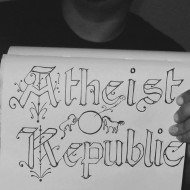
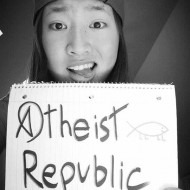
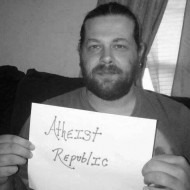

















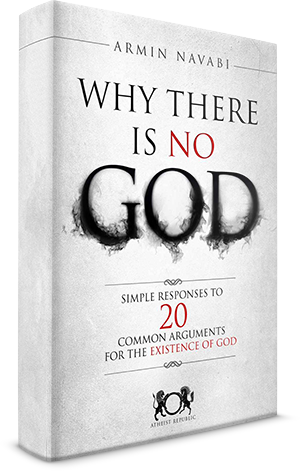
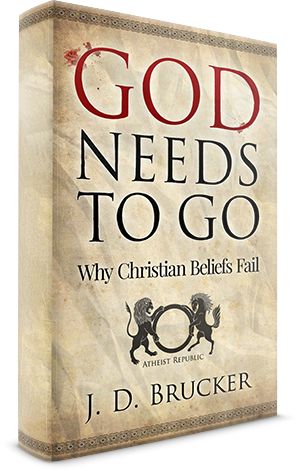
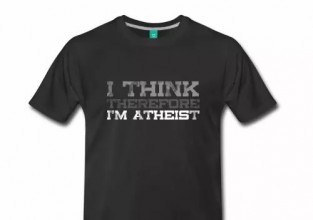


This may sound over-simplistic, but you don't have to prove anything. The burden of proof for the existence of god(s) is on them, not you. They will be the one asserting that god(s) exist. Most people realize they are atheist when they arrive at the understanding that there is simply no substantive evidence for god(s)' existence. If you choose to explain your thoughts, that's pretty much all you might say.
They will, absolutely, say that you are wrong...along with any number of threats. The choice is entirely yours to engage in any further dialog about it. If you want to learn more, there are a number of great books and some good debates on you tube. There you will find potential responses to anything they may throw at you. Try them on, see if they fit, use them if they suit who you are and what you think.
Simplistic perhaps, but perfectly true.
This theism thing is their fight, not ours. They're the ones that have yet to furnish proof.
Well said
Thanks that will help a lot! Are there any books or videos you would recommend?
You can start by checking out the book reviews here at AR.
Yes, there's some real gems in there! That section of the site has definitely filled my summer reading list.
Soshire, I have read many of the books reviewed here on the forum. Feel free to ask me which ones are worth the read and which ones just take your money. And CyberLn is right, you don't have to prove anything. :)
Hi Soshire.I was born in a Christian family but now being the only Atheist in my family and just a handful in all of my State,i'm challenge almost everyday by them.i'm even having a chat(debate kind of)in Facebook.By the way my state have 90-95 % Christian.which books would you suggest for me.
Sorry Soshire it was meant for efpierce
Dawkins, Hitchens, and Harris are good starting places for books. Is the community you live in full of fundies? New earthers? If so, watch the Bill Nye / Ken Hamm debate on YouTube.
older gen believes in creation,new gen in evolution(God's plan). how about books on philosophy(atheism Philo?).any Good read for the layman such as I?
Well, atheism is not a philosophy. It is simply the determination, based on scientific principles (e.g. a lack of imperical evidence) that god(s) don't exist.
All the writers I mentioned earlier provide information on why folks reach that determination.
Exaclty.I've read The god delusion and have a book or two of the other authors too(but in pdf format)so haven't got around to read them yet.What i meant was books like friedrich nietzsche's.I've been chatting with someone and i posted this earlier here:
http://www.atheistrepublic.com/forums/debate-room/recently-ive-been-ask-...
and who recently posted this:
(Why scientific enterprise makes sense- A Christian response
Views on human origin have implications on human nature and the nature of human cognitive faculty. Completely naturalistic Darwinian view of human origin is no different. From a Darwinian perspective, human beings are just another animal and human thinking faculty is the result of variation (mutations) acted upon by Natural selection. The implication is that, human faculty evolved according to the ability to survive in a given environment. Which means our thinking faculty was a survival tool for a given environment. Which means it was evolved to give the right reaction in such a way that the organism would survive in a given environment and not necessarily to think universal truth. This should make the reliability of our thinking faculty doubtful. A point explicitly made even by atheist Alex Rosenberg in his book, Atheist guide to reality. This idea is not unique to Rosenberg, even atheist Michael Shermer said “Humans are pattern-seeking story-telling animals, and we are quite adept at telling stories about patterns, whether they exist or not.” This view of Shermer is not far off from Darwinian view of human faculty. With such reasons to doubt the reliability of human cognitive faculty, the question, Does the enterprise of science, which heavily depends on human cognitive faculty, makes sense? Many may justify engaging in the enterprise of science by pointing at the success of science. That only take us to another question, why is scientific enterprise successful? Given the role played by science in our present world, this question is worth asking. To this question, different worldviews may answer differently (or may fail to answer).
This is an attempt to answer the question “why the scientific enterprise makes sense?” from a Christian worldview. Though a comprehensive definition of science seems elusive to the philosophers of science, science in a general way is the search for truth about the universe. According to Christianity, universe is the result of a personal creator, God. That God as a rational law giver is embedded in Christian teachings. Christianity also teaches that Human beings are the result of God’s creation, who made them in His image. There are many facets about the nature of being made in the Image of God; two important facets (in the context of this article) are stressed here for the purpose of this argument.
First, being made in the Image of God means human beings, like God, are persons. Thus, human reasoning activity is viewed as the result of a unified personhood rather than mere collective activities of different neurons. This explains the reliability of human reason much better than those worldviews that reduce human reasoning to mere activities of neurons (as done by Daniel Dennet) or considers unified self as a fiction (as believed by Steven Pinker). Here is why it is so; while engaging in reasoning that involves several steps, this sequence takes place:
At Time 1 (T1), Naro thinks, A=B
At Time 2 (T2), Naro thinks, B=C
Therefore,
At Time 3 (T3), Naro thinks, A=C.
What is required for inference of A=C in this sequence of reasoning is a unified self of ‘Naro’ over different time intervals (T1, T2, and T 3) or else it would be like ‘Naro’ thinking A=B at T1, and ‘Temjen’ thinking B=C at T2, which would make thinking A=C impossible. Thus, the idea of human beings being a unified self as taught in Christian worldview gives a good explanation for the kind of reasoning constantly use in the enterprise of science.
Secondly, being made in the Image of God means humans have an intellect like that of God (i.e. The intelligence of human being is different from God not in terms of types but in terms of degree). The implication is, Humans can think like God. This idea is particularly important as a philosophical foundation for human beings to engage in scientific enterprise. One important assumption to be made for undertaking the scientific enterprise is, the universe out there can be studied and understood by human being. That statement is not or cannot be proved by science but rather it is assumed by science. Such assumption raises the question, what theoretical justification can be given for that assumption to be legitimate? After all, why should what goes on in my mind should match with what goes on in the universe? Christian worldview has its answer to that question. As mentioned above, Christianity teaches that God created the universe according to His rational mind and humans who being able to think like God can therefore discover the workings of the universe as it was made according to the thinking of that God. This view may seem obvious to a person living in 21st century but studying the cultures before scientific revolution makes it clear that the belief in the ability of human mind to discover the laws or the workings of the universe wasn’t so obvious. It is indeed no historical coincidence that such courage to trust the ability of human mind to discover the working of the universe was developed in Christian Europe, the birth place of modern science as we know it (Science as we know it originated only once and it was in Christian Europe). For this reason sociologist and philosopher of science Steve Fuller (who is an atheist) argued that the Science was developed with “the belief that the natural order is the product of a single intelligence from which our own intelligence descends.” Thus from a Christian worldview, scientific enterprise is, in the words of a pioneer of science Johannes Kepler, “thinking God’s thought after Him”, for which Christian theology give ample justification.
Thus, a Christian has his/her philosophical justifications for why scientific enterprise makes sense, which is rooted in Christian theology. This leads to the question, is the Christian narrative of Human being as image bearer of God just a useful narrative for science or is it really true? The answer seems to lie in the actual practice of science and mathematics. The history clearly shows the applicability of mathematics in physical sciences. The success of mathematics lies not only in helping in explaining some physical phenomena but using mathematics to predict discoveries in physical sciences, without any experimental evidence. Here is what happens, simply by using mathematical calculation with no experimentation, prediction are often made that will be discovered experimentally in future. This trend is not a matter of one single occurrence but did happen multiple times. This has profound philosophical implications. Why would the logical calculation by human beings as done in mathematics lead to insights about the universe? If human are just “pattern seekers”, how come the realities of the physical world constantly conform to the thinking of human being? Or as Albert Einstein asked, “How can it be that mathematics, being after all a product of human thought which is independent of experience, is so admirably appropriate to the objects of reality?” Perhaps human mind isn’t just a product of variation acted upon by natural selection to survive, perhaps we are not just “pattern seekers”, rather it is reasonable to say that we are capable of “thinking God’s thought after Him” and the very fact that we can discover about the universe using our reason shows that the universe is rational, pointing to the direction that it might have been a result of rational mind.)
so i was thinking of digging more on the philosophical side too.
Thanks any books or videos you would recommend efpierce?
They are right, people will always try to change your mind, but the beauty of it is that it is still your mind, not the mind of everyone else in the congregation like theirs is.
Thanks everyone for the advice been really busy with finals but looking forward to get back onto my research and learning on the truth
I'm a new Atheist, too. My husband and I both used to be Christians, but we got interested in learning what atheists believed, originally so we could effectively counter their arguments, but we ended up being convinced once we read "God is not Great" by Christopher Hitchens. Both of our parents and everyone we know are very religious. We live right in the middle of the bible belt, and I've only met a handful of atheists in my life, and only one of them has remained atheist once people found out and bombarded them with conversion attempts. My being forced to hide my beliefs has made me want to be even more sure about them than I would be otherwise and I have spent weeks studying the bible and have found an unbelievable amount of contradictions. I suggest you go to bibviz.com and skepticsannotatedbible.com if you want to study them for yourself. I've been talking with a christian who was determined to prove me wrong, and the points that he admitted to being unable to answer were contradictions concerning numerical values in the bible. These are impossible to blame on interpretation or translation issues, so the only choice Christians have is to admit they don't know, and in my opponent's case, claim that God allowed flaws in the Bible that way people could still choose to not have faith in him.
There is no way around crazy rationalizations, but any Christian who is willing to accept logic (however rare that may be), cannot refute arguments taken right out of their own book.
I don't know what I am anymore. LOL. I am glad you came to the place of knowing you do not believe in a God that the Christians believe in. It should bring some peace to you hopefully. I have decided one thing, I will no longer try to convince atheists of God I have no proof of other than the bible. That is my only proof. Miracles have seemed to have happened before and don't refute that. But then again, I have no proof. I don't know if I call myself a Christian anymore.
Confused; What "Miracles?"
All good advice guys..
.. And hey soshire, never forget the good old honest answer "I don't know!"
That really is the fundamental difference between a theist and an atheist. A theist believes they know what is impossible to know, we atheists KNOW that we don't know :)
Excellent point :)
Watch the God Who Wasn't There. It's about an ex-Christian who goes on a journey to expose contradictions in the Bible.
I think the reason the bible says god created us in his image is both to tie us to god and to tie god to us.
In essence were special because god made us like he is. And gods special because hes like us.